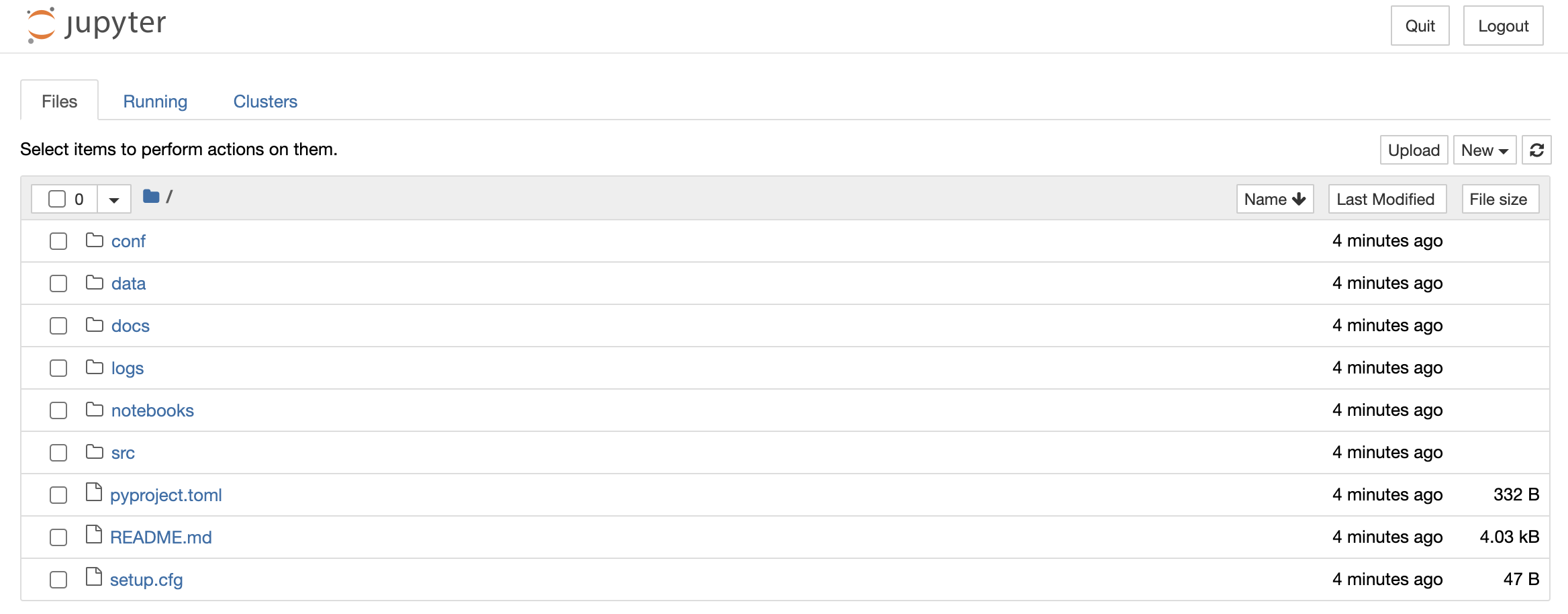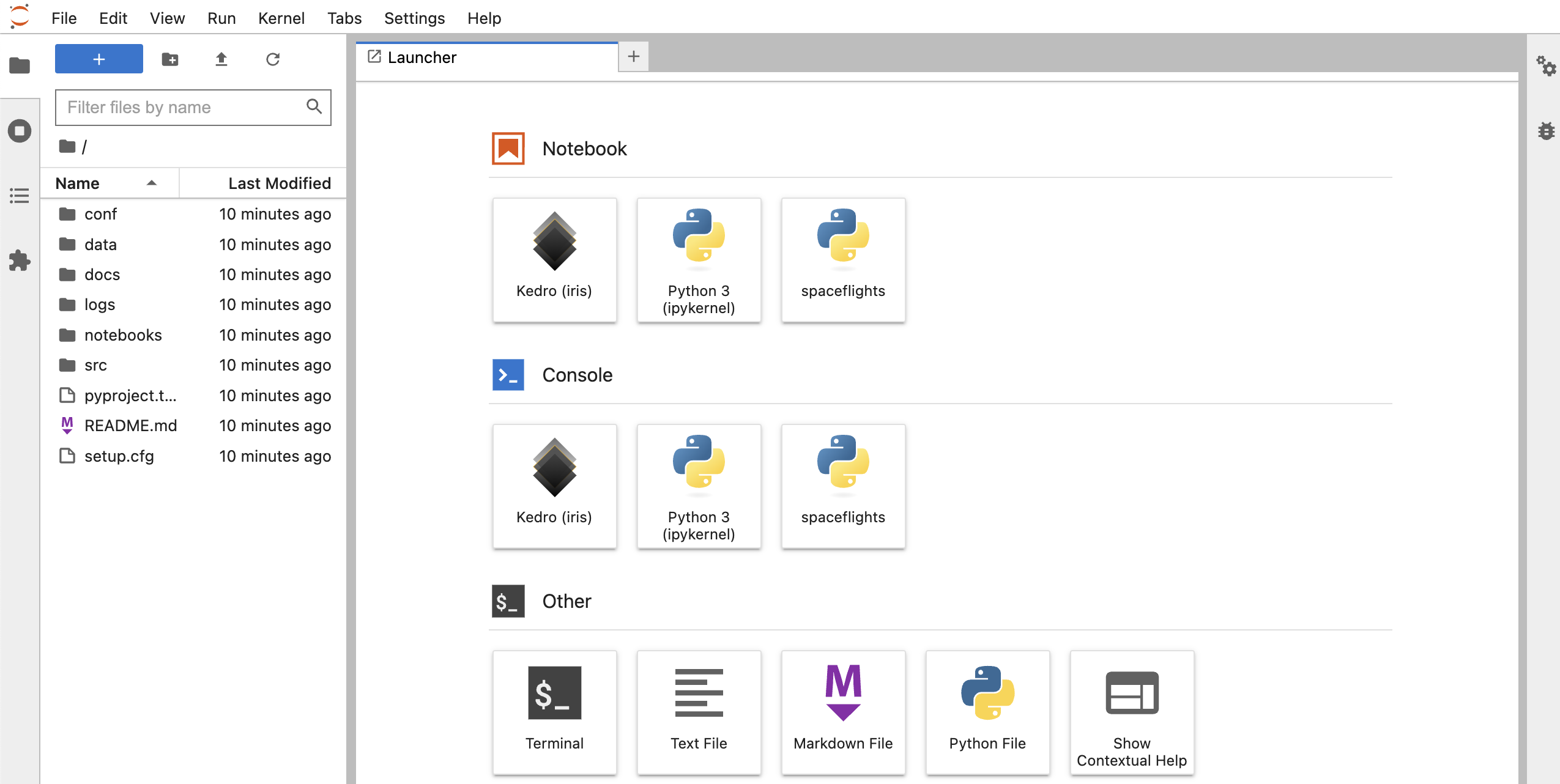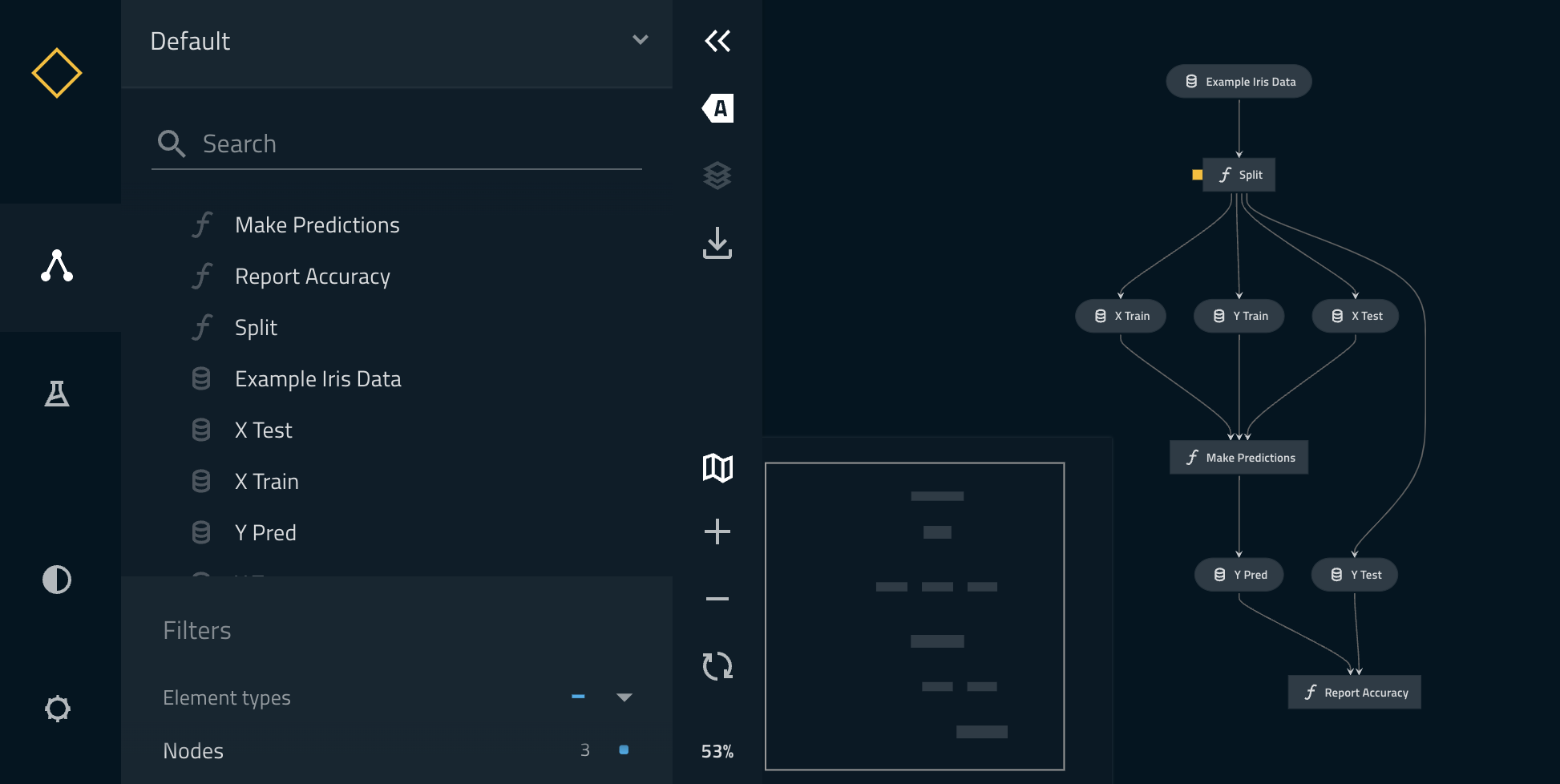Kedro と Jupyter
KedroはJupyter NotebookやJupyter Lab、IPythonと組み合わせて開発することができます。
$ kedro jupyter notebook

$ kedro jupyter lab

$ kedro ipython
In [1]:
In [2]: exit()
Kedro variables
KedroではJupyter Notebook内で次の変数を使うことができます。
catalogcontextpipelinessession
pandas-irisのサンプルプロジェクトを作成して上記の変数を確認していきます。
$ kedro new --starter=pandas-iris
$ cd iris
$ kedro jupyter notebook
New > Kedro (iris)をクリックして新しいノートブックを作成します。

catalog
catalogではパラメータを含むDataCatalogを探索することができます。
In [1]: catalog.list()
[
'example_iris_data',
'parameters',
'params:train_fraction',
'params:random_state',
'params:target_column'
]
In [2]: catalog.load("example_iris_data")
INFO Loading data from 'example_iris_data' (CSVDataSet)...
sepal_length sepal_width petal_length petal_width species
0 5.1 3.5 1.4 0.2 setosa
1 4.9 3.0 1.4 0.2 setosa
2 4.7 3.2 1.3 0.2 setosa
3 4.6 3.1 1.5 0.2 setosa
4 5.0 3.6 1.4 0.2 setosa
... ... ... ... ... ...
145 6.7 3.0 5.2 2.3 virginica
146 6.3 2.5 5.0 1.9 virginica
147 6.5 3.0 5.2 2.0 virginica
148 6.2 3.4 5.4 2.3 virginica
149 5.9 3.0 5.1 1.8 virginica
150 rows × 5 columns
In [3]: catalog.load("parameters")
INFO Loading data from 'parameters' (MemoryDataSet)...
{'train_fraction': 0.8, 'random_state': 3, 'target_column': 'species'}
context
contextではkedroのライブラリコンポーネントやプロジェクトのメタデータにアクセスすることができます。
In [4]: context.project_path
PosixPath('/Users/ryu/iris')
pipeline
pipelineを使うとプロジェクトに登録しているパイプラインを表示することができます。
In [5]: pipelines
{'__default__': Pipeline([
Node(split_data, ['example_iris_data', 'parameters'], ['X_train', 'X_test', 'y_train', 'y_test'], 'split'),
Node(make_predictions, ['X_train', 'X_test', 'y_train'], 'y_pred', 'make_predictions'),
Node(report_accuracy, ['y_pred', 'y_test'], None, 'report_accuracy')
])}
In [6]: pipelines["__default__"].all_outputs()
{'y_test', 'y_train', 'X_test', 'y_pred', 'X_train'}
session
sessionを使うとパイプラインを実行することができます。
In [7]: session.run()
[01/15/23 09:24:05] INFO Kedro project iris session.py:340
[01/15/23 09:24:06] INFO Loading data from 'example_iris_data' (CSVDataSet)... data_catalog.py:343
INFO Loading data from 'parameters' (MemoryDataSet)... data_catalog.py:343
INFO Running node: split: split_data([example_iris_data,parameters]) -> node.py:327
[X_train,X_test,y_train,y_test]
INFO Saving data to 'X_train' (MemoryDataSet)... data_catalog.py:382
INFO Saving data to 'X_test' (MemoryDataSet)... data_catalog.py:382
INFO Saving data to 'y_train' (MemoryDataSet)... data_catalog.py:382
INFO Saving data to 'y_test' (MemoryDataSet)... data_catalog.py:382
INFO Completed 1 out of 3 tasks sequential_runner.py:85
INFO Loading data from 'X_train' (MemoryDataSet)... data_catalog.py:343
INFO Loading data from 'X_test' (MemoryDataSet)... data_catalog.py:343
INFO Loading data from 'y_train' (MemoryDataSet)... data_catalog.py:343
INFO Running node: make_predictions: make_predictions([X_train,X_test,y_train]) node.py:327
-> [y_pred]
INFO Saving data to 'y_pred' (MemoryDataSet)... data_catalog.py:382
INFO Completed 2 out of 3 tasks sequential_runner.py:85
INFO Loading data from 'y_pred' (MemoryDataSet)... data_catalog.py:343
INFO Loading data from 'y_test' (MemoryDataSet)... data_catalog.py:343
INFO Running node: report_accuracy: report_accuracy([y_pred,y_test]) -> None node.py:327
INFO Model has accuracy of 0.933 on test data. nodes.py:74
INFO Completed 3 out of 3 tasks sequential_runner.py:85
INFO Pipeline execution completed successfully. runner.py:90
%reload_kedro
%reload_kedroを実行するとKedroの変数をリロードすることができます。
In [8]: %reload_kedro
[01/15/23 09:25:42] INFO Resolved project path as: /Users/ryu/iris. __init__.py:132
To set a different path, run '%reload_kedro <project_root>'
[01/15/23 09:25:43] INFO Kedro project Iris __init__.py:101
INFO Defined global variable 'context', 'session', 'catalog' and __init__.py:102
'pipelines'
INFO Registered line magic 'run_viz' __init__.py:108
%reload_kedroのドキュメントは次のコマンドで確認することができます。
In [9]: %reload_kedro?
Docstring:
::
%reload_kedro [-e ENV] [--params PARAMS] [path]
The `%reload_kedro` IPython line magic. See
https://kedro.readthedocs.io/en/stable/tools_integration/ipython.html for more.
positional arguments:
path Path to the project root directory. If not given, use the
previously setproject root.
optional arguments:
-e ENV, --env ENV Kedro configuration environment name. Defaults to
`local`.
--params PARAMS Specify extra parameters that you want to pass to the
context initializer. Items must be separated by comma,
keys - by colon, example: param1:value1,param2:value2.
Each parameter is split by the first comma, so parameter
values are allowed to contain colons, parameter keys are
not. To pass a nested dictionary as parameter, separate
keys by '.', example: param_group.param1:value1.
File: ~/Program/MLOps/kedro/venv/lib/python3.8/site-packages/kedro/ipython/__init__.py
%run_viz
%run_vizを実行するとKedro-Vizを起動することができます。
In [10]: %run_viz

Jupyter Notebook のコードを Node にコンバート
Kedroでは、Jupyter Notebookで書いたコードをNodeにコピーすることができます。
Jupyter Notebookに次の関数が記述されているとします。
def some_action():
print("This function came from `notebooks/my_notebook.ipynb`")
Jupyter Notebook上でView > Cell Toolbar > Tagsをクリックし、nodeタグをセルにつけます。


my_notebookと名付けてJupyter Notebookを保存し、次のコマンドでファイルをnotebooksフォルダに移します。
$ mv my_notebook.ipynb notebooks
次のコマンドを実行します。
$ kedro jupyter convert notebooks/my_notebook.ipynb
src/iris/nodes/my_notebook.pyに関数が追加されたことが確認できます。
$ cat src/iris/nodes/my_notebook.py
def some_action():
print("This function came from `notebooks/my_notebook.ipynb`")
参考